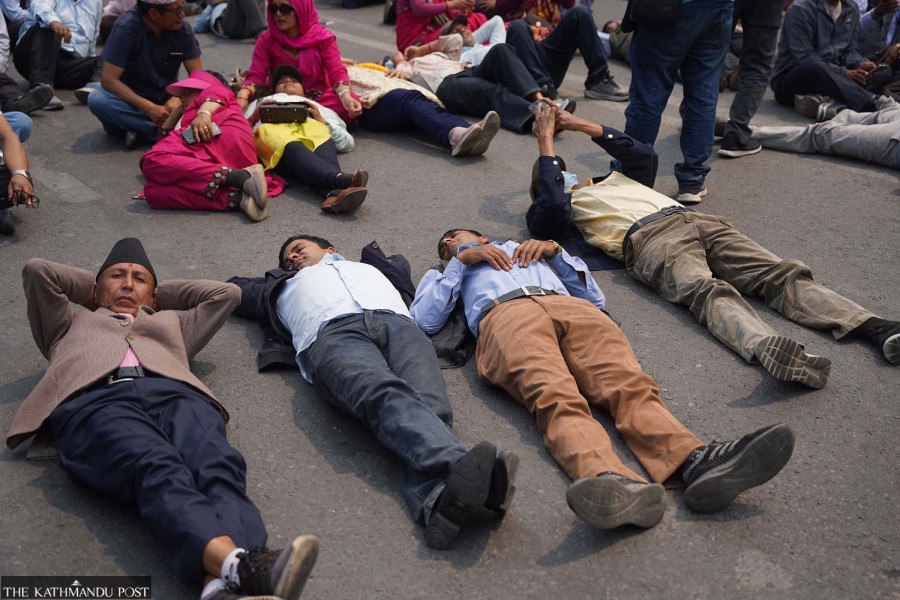National
School teachers turn down call for talks
They remain defiant in their demand for a new School Education Act incorporating past deals with the government.
Binod Ghimire
Ignoring the government’s repetitive calls for dialogue, thousands of teachers have continued hitting the streets demanding a new School Education Act.
The teachers, united under the banner of Teachers’ Federation Nepal, started the mass show on Wednesday. The move came after President Ramchandra Paudel, on government recommendation, prorogued the federal parliament session on Tuesday without endorsing the school education bill that has been pending in a House committee for over a year and a half. The Ministry of Education invited the federation to dialogue on the first day of the protest.
But the federation refused to sit for talks, arguing there was no point in talking as it only wanted the new Act, including the agreements.
On Friday, then acting Prime Minister Prakash Man Singh invited the protesters to the talks, but the federation turned it down. Along with Singh, Home Minister Ramesh Lekhak, Education Minister Bidya Bhattarai and the ruling party lawmakers had waited for the agitators to come for talks.
But the teachers did not show up. “We have had ample dialogues and have reached different agreements in the past. Let the law be enacted incorporating the already agreed provisions,” said Laxmi Kishor Subedi, the federation’s chair. “There is no reason to hold further talks.”
The federation sealed three agreements with successive governments in the past. When Devendra Paudel of the CPN (Maoist Centre) was the education minister, he had agreed that the teachers would be under the federal government, though the constitution envisions that local governments can manage school education. Teachers want that provision to be included in the new Act.
Right after the government introduced the bill in the federal parliament in September 2023, the federation staged a Kathmandu-centric agitation objecting to different provisions in the bill. Thousands of teachers staged protests in Kathmandu, disrupting life in the capital city and forcing the government into a dialogue.
They withdrew the protest after sealing a six-point deal with the government, which promised to address their demands by revising the bill. Along with retaining the teachers under the federal government, including them in the order of precedence and increasing the entry age of a teacher to 40 are their other demands.
Ensuring payment of the salary on a monthly basis and pay and perks at par with the civil servants are other demands the agitating teachers have forwarded.
Moreover, they have also demanded a dedicated hospital for teachers just like there is an army hospital, police hospitals and a Civil Service Hospital.
Despite reiterated commitments of the political leadership, the bill couldn’t be endorsed by the parliament following huge differences among the lawmakers.
Over 150 amendments have been registered in the bill that is under deliberations in the Education, Health and Information Technology Committee of the House of Representatives. Currently, a sub-committee within the House committee is holding provincial-level deliberations on the bill.
The subpanel has received mutually contradictory suggestions on several issues, including teacher management. As the constitution lists school education as the absolute authority of the local government, some lawmakers want teachers to work under the local governments. However, there are amendments to continue them under the federal government, as education has been listed as the concurrent authority of all tiers of government.
Even as the teachers claim they will not sit for dialogue, Prime Minister KP Sharma Oli on Saturday said the issue will be resolved through dialogue. Upon his arrival from Bangkok after attending the sixth Bimstec Summit, he said the teachers came to Kathmandu believing the government would listen.
“They believe that if they raise their voices, the government will listen,” said Oli. “There was no need for large numbers to show up. Even a small delegation would have been enough to deliver their message. This issue will be resolved and they will leave soon.” He said he would see how the teachers’ demands could be addressed.
Federation chair Subedi said the government can either call a new House session to endorse the bill or can issue an ordinance to address their concerns.
Enactment of the Act is a must to implement the Constitution of Nepal which can delegate most of the authority to manage the education sector to the local and provincial levels. However, almost a decade after the constitution came into force, the country is yet to get the Act.




 10.12°C Kathmandu
10.12°C Kathmandu















